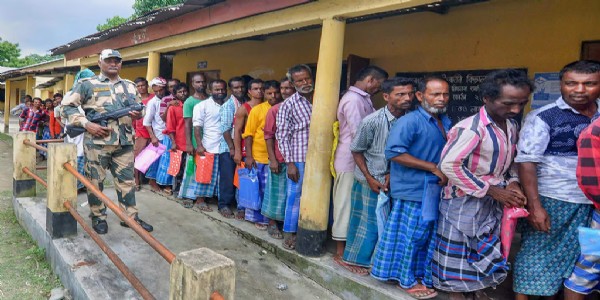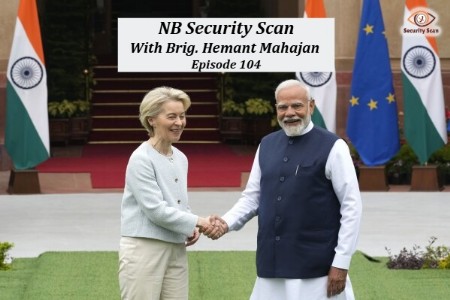#SecurityScan 11: Appointment of India's Second CDS, India's ability to wage peace at UN and more
Threat to India"s security a multi domain ,multifarious and only a United India with vigilant citizens who become eyes and years of the security forces can guard India"s security effectively.
Total Views | 491
This article is a summary of important events that have taken place in last one week affecting, India's national security. Attempt has also been made to analyze these events and recommend certain specific actions that can be undertaken by us.
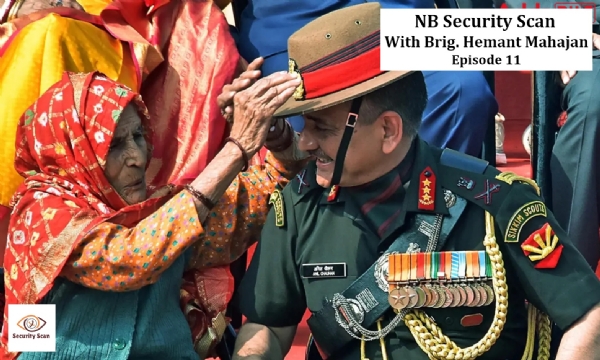
Lt Gen Anil Chauhan, is new CDS
The Government announced on wednesday that it was appointing Lt General Anil Chauhan (retired) as the new CDS, more than nine months after the death of the country’s first Chief of Defence Staff, General Bipin Rawat.
This is the first instance in the country of a retired officer returning after a period of time to uniform to serve as its most senior officer. Rawat took over as CDS the day after his retirement as Army Chief.
Gen Chauhan was commissioned into the 11 Gorkha Rifles in 1981. His predecessor, Rawat, was also from 11 Gorkhas.“In the rank of Maj General, the officer had commanded an Infantry Division in the critical Baramulla sector in the Northern Command. Later as Lt General, he commanded a corps in the North East and subsequently went to become the General Officer Commanding-in-Chief of the Eastern Command from September 2019 and held the charge until his retirement from the service in May 2021.
Gen Chauhan also held important staff appointments, including the charge of Director General of Military Operations.
“Earlier, he had also served on a United Nations mission to Angola. He superannuated from the Indian Army on 31 May 2021. After his retirement, Chauhan joined the National Security Council Secretariat as Military Advisor, replacing Lt Gen Vinod G Khandare who stepped down from the post in October 2021.
The most important task for the new CDS is to complete theaterization of armed forces command, integrate war fighting in all domains and improve armed forces capability to carry out offensive operations in the hybrid domain.
INTERNAL SECURITY
The Central government on Wednesday declared the Popular Front of India (PFI) and its associates, affiliates or fronts – specifically naming eight of them – as “unlawful association” under Section 3 of the Unlawful Activities (Prevention) Act, 1967, for a period of five years. The eight “associates, affiliates or fronts” of PFI also banned as “unlawful association” are Rehab India Foundation (RIF), Campus Front of India (CFI), All India Imams Council (AIIC), National Confederation of Human Rights Organization (NCHRO), National Women’s Front, Junior Front, Empower India Foundation and Rehab Foundation, Kerala.
The Centre said leaders of banned outfits like Students Islamic Movement of India (SIMI) and Jamat-ul-Mujahideen Bangladesh(JMB) were founding fathers of PFI. Also, there have been several instances of international linkages of PFI with global terroror organisations like the Islamic State of Iraq and Syria (ISIS).
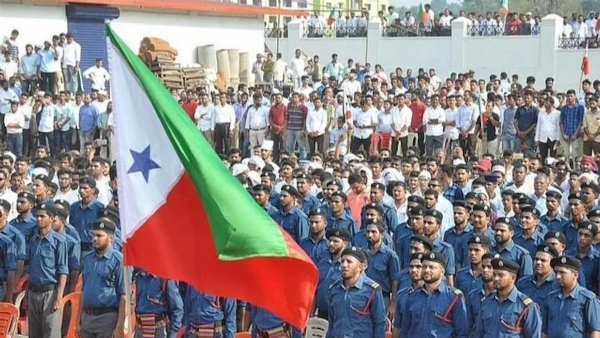
“PFI and its associates or affiliates or fronts have been working covertly to increase radicalization of one community by promoting a sense of insecurity in the country, which is substantiated by the fact that the some PFI cadres have joined international terrorist organisations,” stated the notification.
Centre said PFI is involved in several criminal and terror cases and shows sheer disrespect towards the constitutional authority of the country and with funds and ideological support from outside it has become a major threat to internal security of the country.
Banning PFI is not going to dismantle this organisation. The security agencies have to launch attack on multiple fronts to reduce its effectiveness. One of the most important ways is cutting its financing. Many West Asian countries and charity organisations have been financing radicalisation in India. A full proof mechanism to track the source of funding will be one of the effective ways to stop growth of PFI.
Punjab May Join Rajasthan, Chhattisgarh In Junking NPS
Punjab CM Bhagwant Mann announced that his government was studying the modalities of reverting to the old pension system (OPS). OPS’s defining feature is a guaranteed monthly payout that gets adjusted for inflation.
This is fiscally ruinous. India cannot afford fiscal recklessness. To prevent it, governments must not give in to extravagant demands of any section of society. The cost has to be borne by others. All state governments should stick to NPS.
How To Fix India’s Broken Police Forces -Shree Prakash Singh
Sixteen years ago, on September 22, 2006, the Supreme Court gave a landmark judgment on police reforms. It raised great expectations, that Police would become accountable and people-friendly. The police fraternity has since been observing September 22 as Police Reforms Day. There has been some half-hearted compliance with the judicial directions but generally, the states have shown as Justice Thomas Committee recorded “indifference to the issue of police reforms”.
People do not have confidence in the police. This is particularly true of the lower strata of society, who feel that there is one law for the poor and another for the rich and powerful. This perception has to change.
The police have to act professionally. If the country is to progress and emerge as a great power, there is no alternative to radical reforms in the police.
EXTERNAL SECURITY
Advisory For Indians In Canada And Those Travelling To Canada
With its advisory for Indians in Canada and those travelling to the country, New Delhi has sent as strong a message to the Trudeau government that it is fast losing patience with Ottawa for not paying heed to India’s serious concerns on issues of national unity and religious peace. That the ties were nose diving was evident when the Ministry of External Affairs expressed dissatisfaction over Canada’s feeble response to complaints regarding the Khalistan referendum held in Brampton.
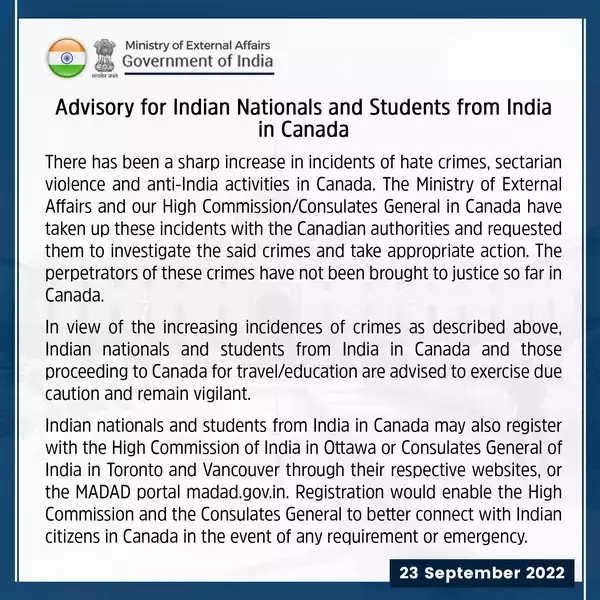
Its refusal to act against those who espouse anti-India sentiments could dent efforts for having a broader relationship, particularly on strategic and economic matters.Canada, by allowing the fringe elements among the Sikh diaspora to fuel separatism and violence, betrays India’s and, indeed, Punjab’s trust.
Turning a blind eye to extremist groups is a policy whose time has run out. Inaction by Canada’s political leadership now would mean that Indian sensitivities do not count much.
Canada must be made to pay the price by stopping all the immigration, students flow, tourism from India.
COUNTERING CHINA'S HYBRID WAR
Most Important Week At UN- India’s ability to wage peace is set to increase
It was a hectic week for external affairs minister S Jaishankar at the United Nations (UN) — meeting leaders from every continent, representing extremely diverse viewpoints about the current moment in international politics and with varying intensity of relations with New Delhi. It culminated with his speech at the UN General Assembly, which presented a picture of a confident India engaging with the world on its terms, while retaining its role as a credible democratic power.
PM Modi’s words – “Today’s era is not of war” – to President Putin on the sidelines of the SCO summit as India finally telling Russia what needed telling. The larger point is whether India can play an even larger role as a peace advocate –its advocacy will be one of the critical diplomatic factors when a conflict breaks out. There are reasons to believe that India’s ability to wage peace will get considerably stronger.
In global realpolitik, economic heft matters. India, already the world’s fifth largest economy, is looking at years of steady, if not spectacular, GDP growth that will, as per current research, make it the world’s fourth largest economy by 2027 and third largest by 2029.
Dr S Jaishankar comments on Ukraine were watched, as they came days after Prime Minister Narendra Modi was lauded by western countries for telling Russian President Vladimir Putin that the “era of war is over”. Mr. Jaishankar expanded on Mr. Modi’s theme, he said, India stands on the side of peace, of respect for the UN charter, dialogue and diplomacy, and with all those now grappling with the “escalating costs of food, of fuel and fertilizers”. His words were even-handed, and require global stakeholders to consider the risks from the conflict in Ukraine.
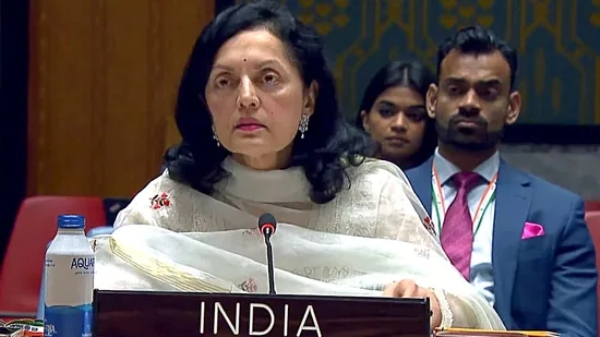
India’s has the advantage of India’s excellent record as a non-aggressor. A big country with a big economy that has never harboured war-like tendencies is a powerful peace advocate. And in Modi, whose national mandates in the world’s largest democracy give him global political heft, India has a PM who can effectively leverage the country’s strengths. The peace principle has a long pedigree in India, it’s a part of India’s civilisational ethos. Perhaps, the 21st century will see India’s emergence as an influential peace advocate.
In global realpolitik, economic heft matters. India, already the world’s fifth largest economy, is looking at years of steady, GDP growth that will, as per current research, make it the world’s fourth largest economy by 2027 and third largest by 2029.
Russian Threat To Use Nuclear Weapons in Ukraine
This is a grim moment. As soon as the military balance of power on the ground shifted in Kyiv’s favour and diplomatic pressure increased, Russian president Vladimir Putin chose confrontation over retreat. Moscow is holding what will be managed referen-dums with no international credibility to formalise its control over parts of Ukraine and integrate it into Russian territory.
It has announced additional mobilisation. And in an act of irresponsibility, Mr Putin has issued a nuclear threat. Was his comment, “we are not bluffing”, meant to add to the credibility of the threat? The Americans haven’t noticed any additional operational moves, and past threats haven’t deterred western support for Ukraine. Or is it a real signal? It is clear that the war will continue and make the world more unstable.
Using nuclear weapons would be an existential gamble for Putin. But if he was headed for a defeat that threatened his hold on power, and perhaps his life, then why not gamble big rather than end up like Moammad Al Qaddafi.
It is sobering to realize that we are now in the gravest great-power nuclear crisis in a half-century. It is more sobering still to think that avoiding nuclear escalation may require Putin to show more prudence and caution in ending this war than he did in starting it.
China’s Repression of Uyghurs in Xinjiang
More than a million Uyghur Muslims have been arbitrarily detained in China’s Xinjiang region. The reeducation camps are one part of the government’s crackdown on Uyghurs.
Several countries, have declared that China is committing genocide against Uyghurs;. Many countries have sanctioned Chinese officials and entities linked to rights abuses.
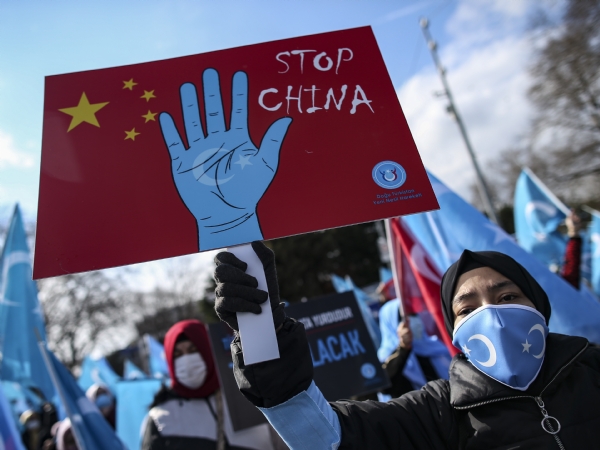
Additionally, foreign governments have imposed restrictions to address forced labor in Xinjiang. The United States has essentially banned all imports from the region through its Uyghur Forced Labor Prevention Act, and the United Kingdom has proposed measures to fine companies that fail to guarantee their supply chains do not use forced labor. The European Parliament adopted a nonbinding resolution in mid-2022 urging EU countries to ban imports made with forced labor.
China’s partners have been notably silent. In June 2022, sixty countries signed a statement calling for the UN human rights chief to respect that Xinjiang-related issues are “China’s internal affairs” and stating that they “oppose the politicization of human rights.” Muslim-majority countries such as Pakistan and Saudi Arabia were among the signatories; human rights groups of Muslim-majority countries do not condemn the abuses.
China Biggest Supporter of Terror
India's unequivocal calling out of China in the United Nations General Assembly (UNGA) and Security Council (UNSC) supporting terrorist and their patrons puts the spotlight firmly on the misuse of instruments of multilateral bodies for advancing 'national' ambitions at the cost of global need and good. India demonstrated another facet of required reforms in multilateral bodies such as the UN to make them fit for purpose for the 21st century. China's veto on a US-led proposal to designate Sajid Mir, mastermind of the 26/11 Mumbai attack, as global terrorist under the UNSC 1267 Sanctions Regime is a case of politicising a global threat. The Mir veto is the third time this year that China stepped in to use its power to shield a terrorist, a move against India as much in support of Pakistan.
We have to use all world forums to highlight Chinese human right excesses in Tibet, Mongolia, Hong Kong and Mainland China.G-20 and SCO presidency is an opportunity to position India as the voice of world against global terrorism and its supporters like China.
India must have its version of China’s fusion of civil military in naval deployment
Army chief General Manoj Pande recently emphasised the need to develop India’s grey-zone capabilities. Wars of tomorrow will be fought across multiple traditional and non-traditional domains. And China over the last decade has emerged as a fine practitioner of grey-zone warfare. Look, for example, at the fusion between Chinese civilian and military naval assets. Only last month we witnessed a so-called Chinese scientific vessel, Yuan Wang 5, dock at Sri Lanka’s Hambantota port. In reality it was a spy ship capable of tracking intercontinental missiles.
Similarly, China, which has the world’s largest navy, has been deploying civilian trawlers and a maritime militia to assert its maritime claims in the South China Sea. This, despite the fact that the Permanent Court of Arbitration in 2016 had ruled against China’s so-called Nine Dash Line cartographical innovation that laid claim to almost all of the South China Sea region. Chinese fishing vessels numbering in hundreds regularly turn up at disputed island groups like the Spratlys. They even encroach upon traditional fishing grounds and exclusive economic zones (EEZs) of neighbouring states. Add to this China’s hybrid maritime intimidation in the waters around Taiwan, especially after Nancy Pelosi’s visit to the island in August.
COAS is right that such civilian-military maritime forces mean formidable strategic and tactical worries for India. To counter this India needs to seriously upgrade its coastal defence and sharpen its naval fleet. We need many more high-tech naval vessels and listening posts to counter the China threat. Can we use our merchant shipping and fishing fleet for this purpose?
Other Important Happenings In Brief Without Comments
KSRTC Kerala seeks compensation of Rs 5.06 crores from PFI for damaging buses, says 71 damaged buses won’t resume services soon.
‘US govt gave coffee, biscuits and water to Pakistani delegates, but hosted dinner for Indian MEA Dr Jaishankar’: Journalist laments.
Pakistani army helicopter sent to rescue kidnapped military personnel including two officers blown up by Baloch rebels, 6 killed.
BBC’s latest report on Leicester: A grudging acceptance of the truth while attempting to save Islamists all over again.
At best, the BBC has shifted from totally blaming Hindus for the violence to essentially saying that they don't know who started the violence. However, they are continuing to shield the Islamists of Leicester while tacitly throwing the victims - Hindus - under the bus.
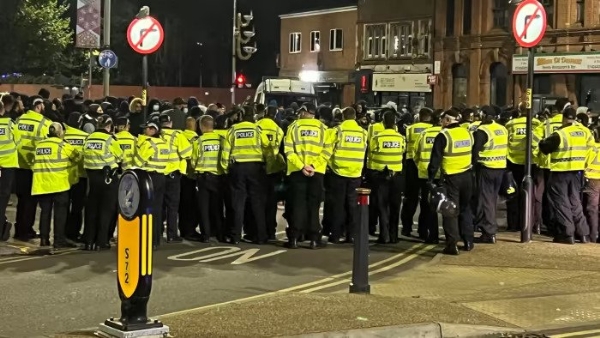
On September 25, British Hindus, an organisation of Hindus living in the United Kingdom, issued a safety advisory for the upcoming festival season amid Islamist violence in the country. In the advisory, the organisation asked the Hindus living in the UK to be vigilant of their surroundings and avoid going out alone considering the threats, especially for women and the elderly.
According to Nepal’s MP Abhishek Pratap Shah, in the last 20 years, the Muslim population in Nepal has doubled from 4.5% to 9% and it may double to 18% in the next 20 years. No wonder, the number of cases of love jihad in Nepal is also on the rise like never before. “A large number of Rohingyas have infiltrated the northern areas of Nepal.
Once there used to be only 1 mosque in Nepal’s capital Kathmandu, today there are 12 mosques in the same city. All these mosques are being built in the name of Sunni and sometimes Wahabi Islam.”
Threat to India's security a multi domain ,multifarious and only a United India with vigilant citizens who become eyes and years of the security forces can guard India's security effectively.
--
Bharati Web
Mes, Pune




